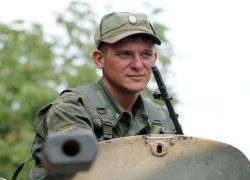Who's in charge? (weekly review) By Vadim Borshchev, special to Prague Watchdog
The Russian military are clearly unwilling to accept that with the ending of the counter-terrorist operation they have been relegated to the role of an auxiliary force which cannot take a step without seeking and obtaining permission from the republic’s leadership. In addition, they can hardly be happy with a situation in which they have been stripped of various privileges and extra funding. Last week they made an attempt to regain their special advantages. On Friday April 24 the joint press centre of the federal Russian troops’ operational headquarters for Chechnya circulated a message announcing the launching of a counter-terrorist operation (CTO) in the Shatoisky and Vedensky districts, as well as in part of the republic’s Shalinsky district. The main argument in support of the operation was the activity of illegal armed groups.
On the same day, several media sources published reports of a series of incidents that took place against this background. The military leadership, it transpired, knew only too well what it was talking about. A day after the relaunching of special operations, the situation proved to be very restless indeed – there were several explosions in the Chechen capital, and they appeared to be planned. As is evident from the reports of various news agencies, the first two detonations occurred on Ulitsa Mira in the Leninsky district of Grozny, 150 metres from the Sultan Belimkhanov Stadium, just three hours before a Premier League soccer match. The explosives had been placed in a heap of construction debris. A policeman was injured in the blast.
About half an hour later, Russian interior ministry troops (25th command) and Chechen law enforcers appeared on the scene to carry out intelligence operations. At that moment there was a third blast, the consequences of which were more serious. Grozny’s military commandant Colonel Igor Makeyev and a member of the presidential security service received shrapnel wounds.
That same evening, there was an armed clash on the outskirts of the village of Sogunty in Nozhai-Yurtovsky district. Police officers and local FSB forces engaged a group of mujahedin in a gun battle. And at around midnight on the outskirts of the village of Elistanzhi in Vedensky district unknown gunmen opened fire on a temporary Russian interior ministry troop base (unit 5598), killing a contract serviceman.
It might appear that this level of armed insurgent activity would have the effect of laying to rest all questions about the rationale for relaunching the counter-terrorist operations. Yet the republic’s authorities issued sharp statements about the absence of any justification for the introduction of special measures. The Chechen interior ministry’s press centre denied the reports on the deteriorating situation. In its statement it says that "during the past 24 hours not one serious or especially serious crime has been committed." Ramzan Kadyrov was also extremely unhappy with what was happening. He gave the military a ticking-off, pointing out that the incidents fell within the category of normal occurrences which should be dealt with swiftly, without the application of extra measures. “Today, just as they did a month ago, and a year ago, units of the republic’s interior ministry and federal structures carried out special operations to locate, apprehend and eliminate remnants of the gangster groups. This is an everyday task, and it has never stopped, either before or after the ending of the counter-terrorist operation. There is no reason to speak of some dramatic upsurge in activity," he said.
District-by-district counter-terrorist operations are also being launched in neighbouring Ingushetia and Dagestan, and the military leadership there is acting independently, without coordinating its decisions with the republican authorities. The federals, having suffered defeat in the overall battle to preserve the special regime, tried to regain some lost ground by confronting Kadyrov with the fact of its reintroduction. But here too they suffered a crushing defeat.
It is hard to say what mechanisms have been put into action, to know whether Kadyrov appealed to Moscow for support or whether he managed to resolve all the issues within his narrow circle, but on Saturday the military actually disavowed their own decision. Invited to a cabinet meeting chaired by Ramzan Kadyrov was Nikolai Sivak, commander-in-chief of the combined grouping, as well as military commandants and law enforcement representatives. According to the official communiqué, those who took part in the meeting “came to the conclusion that the situation is not at all aggravated and that there are no grounds for talking about any elements of tension... There is no need to declare entire administrative districts zones of counter-terrorist operations.”
The only striking feature of this story is the ease with which the Chechen leader has brought the situation under control. It took him only a day to subdue the federals who were attempting to retain at least a small part of the authority they so recently possessed.
Photo: Newsland. (Translation by DM) (P,DM)
DISCUSSION FORUM
|

